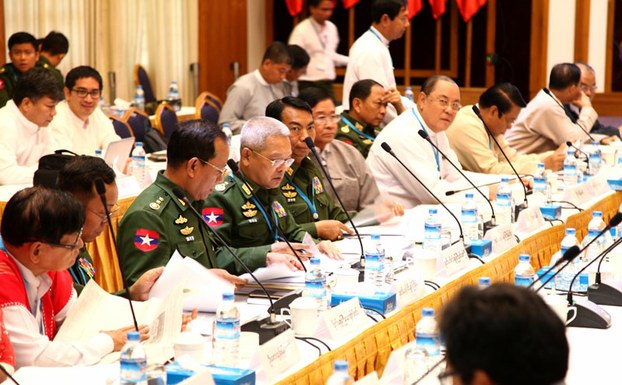




Myanmar government negotiators have refused to discuss a proposal by armed ethnic rebel groups to create a new federal, or “union,” army incorporating soldiers from their groups, according to a rebel leader, complicating talks to draw up a nationwide cease-fire accord that was expected to be signed by the end of the year.
The refusal came on the second day of a new round of cease-fire talks on Tuesday between the government’s Union Peacemaking Work Committee (UPWC) and the Nationwide Ceasefire Coordination Team (NCCT) representing more than a dozen armed ethnic rebel groups in Myanmar’s commercial capital Yangon.
Military officials in the UPCW refused to discuss the federal army plan with the rebel leaders, leading to an early conclusion of talks on Tuesday as the NCCT had to leave to consult with member groups over the development.
“We stopped today’s meeting early because we now have to discuss among our groups what our position will be tomorrow [when talks resume],” NCCT leader Naing Han Tha told RFA’s Myanmar Service.
“In a previous meeting, we had agreed to discuss creating a Union Army in upcoming talks, but the military generals said today that now they can’t approve that agreement,” Naing Han Tha said.
Ethnic rebel leaders have been pushing their plan for a Union Army in negotiations for a nationwide cease-fire accord with the government since last year. The government says any cease-fire accord would be followed by landmark political dialogue that would result in greater powers accorded to ethnic states.
Another hurdle
A requirement for ethnic groups to stop recruiting new members after the signing of the cease-fire agreement has also complicated negotiations.
“They are also holding to their position that ethnic armies can’t recruit new members after signing on to a nationwide cease-fire agreement,” Naing han Tha said, adding, “We told them that we won’t forcibly recruit anyone, but that if someone wants to become our soldier, we will accept them.”
“But they won’t agree to this,” he said.
“We can’t abolish our armed forces or reduce the numbers of our troops unless we can reach an agreement based on political dialogue,” he said. “And if dialogue proceeds smoothly, our armed groups should be able to be absorbed into a Union Army and serve in it.”
Myanmar’s ethnic groups have been seeking a federal system since the country gained independence from Britain after World War II, but the country’s former military rulers resisted their efforts because they equated local autonomy with separatism.
The country’s current president, Thein Sein, has signed bilateral cease-fires with more than a dozen ethnic groups and began last year to pursue a nationwide cease-fire to pave the way for further talks as the country enacts political reforms and transitions to democracy.
A proposed cease-fire agreement has already gone through two drafts and is the product of several rounds of formal and informal meetings between the NCCT and UPWC, led by government minister Aung Min.
But while the Myanmar government agreed in talks in August to establish a federal system of government granting ethnic states increased autonomy, senior Myanmar military leaders may still oppose the move, Naing Han Tha said.
Important step
Four lieutenant generals are in the UPWC team at the latest round of talks to last five days, and their presence is seen as an important step to agreeing a binding deal.
"We soldiers are the one who want peace the most," Lieutenant General Myint Soe, the head of the army's negotiating team, told the meeting, according to Agence France-Presse. “We are not here to find fault with each other.”
But Naing Han Tha said, “We have heard that some top-level military people haven’t accepted the agreement to create a federal union.”
“We have felt, and we have seen, that the military leaders attending these [current] talks can’t make any decisions on their own, and because they can’t make any decisions, I think that a nationwide cease-fire may not be signed in early October.”
“There may be obstacles to accomplishing this,” he said.
Aung Min, a former general at the forefront of the peace efforts, said Myanmar's efforts to secure a historic cease-fire agreement with ethnic armed groups are "at a crucial moment,” AFP reported.
"Everyone accepts that Myanmar's peace process is at a very crucial moment," he said.
Reported by Thiha Tun and Myo Zaw Ko for RFA’s Myanmar Service. Translated by Khet Mar. Written in English by Richard Finney.